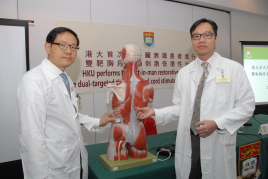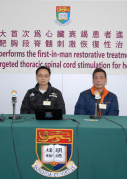Media
HKU performs the first-in-man restorative treatment
– the dual-targeted thoracic spinal cord stimulation for heart failure
05 Feb 2015
Researchers from the Li Ka Shing Faculty of Medicine, The University of Hong Kong (HKU) performed the first-in-man restorative treatment by applying the thoracic spinal cord stimulation for heart failure patients in order to advance their quality of life. The result has been published in an international medical journal Heart Rhythm recently.
Research Implications
“Despite recent advances in the treatment of heart failure, a large proportion of patients with heart failure still suffer from severe symptoms with poor quality of life and clinical outcomes. Therefore, there is a need for alternative therapy for treatment of those patients with severe heart failure. Our first-in-man initial data showed dual-targeted thoracic spinal cord stimulation was safe and improved symptoms and heart function in the patients who had severe symptomatic systolic heart failure. These findings suggest that spinal cord stimulation with an implantable device is a novel therapy in those patients with severe heart failure. Nevertheless, the results of this pilot trial need to be confirmed by further clinical trials in a large number of patients. ” said Professor Tse Hung-fat, William MW Mong Professor in Cardiology and Chair professor of Department of Medicine, Li Ka Shing Faculty of Medicine, HKU.
About the Research
The first-in man experience enrolled 17 patients with New York Heart Association function class Class III heart failure and a left ventricular ejection fraction of 20-35 percent. All patients had implantable defibrillators and were on stable optimal medical therapy. Their devices were programmed to provide spinal cord stimulation (SCS) for 24 hours per day and patients were followed for safety and efficacy endpoints.
During the study, all 17 patients had a successful spinal cord stimulation implant. Among the 15 patients who completed the efficacy endpoint assessments, the composite score improved by 4.2±1.3. Additionally, 11 of 15 patients (73 %) showed improvement in ≥4 of 6 efficacy parameters at six months after SCS implant.
This first-in-man study shows that dual-targeted thoracic SCS was safe and improved symptoms, functional status and heart functioning subjects with severe, symptomatic systolic heart failure despite optimal medical therapy.
Study Background
Heart failure occurs when the heart is unable to pump enough blood to meet the body’s demands. Patients with heart failure are frequently hospitalised, have a reduced quality of life and face a higher risk of death.
Abnormal autonomic nervous system regulation of the cardiovascular system plays an important role in the pathophysiology and progression of heart failure. Spinal cord stimulation with implantable device has been used to treat patients with chronic pain and refractory angina. Our recent pre-clinical studies suggested that neuromodulation with thoracic spinal cord stimulation can improve heart function in animal model of systolic heart failure. With the success of the pre-clinical studies, we started the clinical trial in human.
Research Team
The research is led by Professor Tse Hung-fat, William MW Mong Professor in Cardiology and Chair professor of Department of Medicine, Li Ka Shing Faculty of Medicine, HKU. Other teammates include: Dr David Siu Chung-wah, Clinical Associate Professor, Dr Yiu-Kai-hang, Clinical Assistant Professor of Department of Medicine, Dr Cheung Chi-wai of Department of Anaesthesiology, Li Ka Shing Faculty of Medicine, HKU and professors and doctors from Japan and Australia.
Please visit the website at http://www.med.hku.hk/v1/news-and-events/press-releases for press photos and the powerpoint presentation.
Professor Tse Hung-fat (Left), William MW Mong Professor in Cardiology and Chair professor of Department of Medicine, and Dr Cheung Chi-wai (Right), Clinical Associate Professor of Department of Anaesthesiology, Li Ka Shing Faculty of Medicine, HKU illustrate how the dual-targeted thoracic spinal cord stimulation works.


